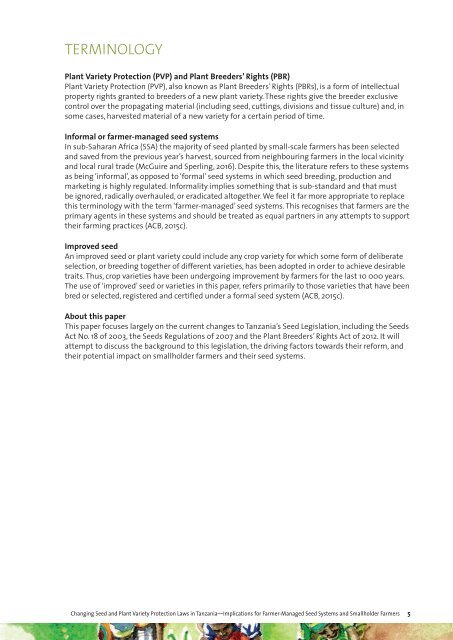Changing Seed and Plant Variety Protection Laws in Tanzania—
Tanzania-Seed-Law-2016
Tanzania-Seed-Law-2016
You also want an ePaper? Increase the reach of your titles
YUMPU automatically turns print PDFs into web optimized ePapers that Google loves.
TERMINOLOGY<br />
<strong>Plant</strong> <strong>Variety</strong> <strong>Protection</strong> (PVP) <strong>and</strong> <strong>Plant</strong> Breeders’ Rights (PBR)<br />
<strong>Plant</strong> <strong>Variety</strong> <strong>Protection</strong> (PVP), also known as <strong>Plant</strong> Breeders’ Rights (PBRs), is a form of <strong>in</strong>tellectual<br />
property rights granted to breeders of a new plant variety. These rights give the breeder exclusive<br />
control over the propagat<strong>in</strong>g material (<strong>in</strong>clud<strong>in</strong>g seed, cutt<strong>in</strong>gs, divisions <strong>and</strong> tissue culture) <strong>and</strong>, <strong>in</strong><br />
some cases, harvested material of a new variety for a certa<strong>in</strong> period of time.<br />
Informal or farmer-managed seed systems<br />
In sub-Saharan Africa (SSA) the majority of seed planted by small-scale farmers has been selected<br />
<strong>and</strong> saved from the previous year’s harvest, sourced from neighbour<strong>in</strong>g farmers <strong>in</strong> the local vic<strong>in</strong>ity<br />
<strong>and</strong> local rural trade (McGuire <strong>and</strong> Sperl<strong>in</strong>g, 2016). Despite this, the literature refers to these systems<br />
as be<strong>in</strong>g ‘<strong>in</strong>formal’, as opposed to ‘formal’ seed systems <strong>in</strong> which seed breed<strong>in</strong>g, production <strong>and</strong><br />
market<strong>in</strong>g is highly regulated. Informality implies someth<strong>in</strong>g that is sub-st<strong>and</strong>ard <strong>and</strong> that must<br />
be ignored, radically overhauled, or eradicated altogether. We feel it far more appropriate to replace<br />
this term<strong>in</strong>ology with the term ‘farmer-managed’ seed systems. This recognises that farmers are the<br />
primary agents <strong>in</strong> these systems <strong>and</strong> should be treated as equal partners <strong>in</strong> any attempts to support<br />
their farm<strong>in</strong>g practices (ACB, 2015c).<br />
Improved seed<br />
An improved seed or plant variety could <strong>in</strong>clude any crop variety for which some form of deliberate<br />
selection, or breed<strong>in</strong>g together of different varieties, has been adopted <strong>in</strong> order to achieve desirable<br />
traits. Thus, crop varieties have been undergo<strong>in</strong>g improvement by farmers for the last 10 000 years.<br />
The use of ‘improved’ seed or varieties <strong>in</strong> this paper, refers primarily to those varieties that have been<br />
bred or selected, registered <strong>and</strong> certified under a formal seed system (ACB, 2015c).<br />
About this paper<br />
This paper focuses largely on the current changes to Tanzania’s <strong>Seed</strong> Legislation, <strong>in</strong>clud<strong>in</strong>g the <strong>Seed</strong>s<br />
Act No. 18 of 2003, the <strong>Seed</strong>s Regulations of 2007 <strong>and</strong> the <strong>Plant</strong> Breeders’ Rights Act of 2012. It will<br />
attempt to discuss the background to this legislation, the driv<strong>in</strong>g factors towards their reform, <strong>and</strong><br />
their potential impact on smallholder farmers <strong>and</strong> their seed systems.<br />
<strong>Chang<strong>in</strong>g</strong> <strong>Seed</strong> <strong>and</strong> <strong>Plant</strong> <strong>Variety</strong> <strong>Protection</strong> <strong>Laws</strong> <strong>in</strong> <strong>Tanzania—</strong>Implications for Farmer-Managed <strong>Seed</strong> Systems <strong>and</strong> Smallholder Farmers 5


